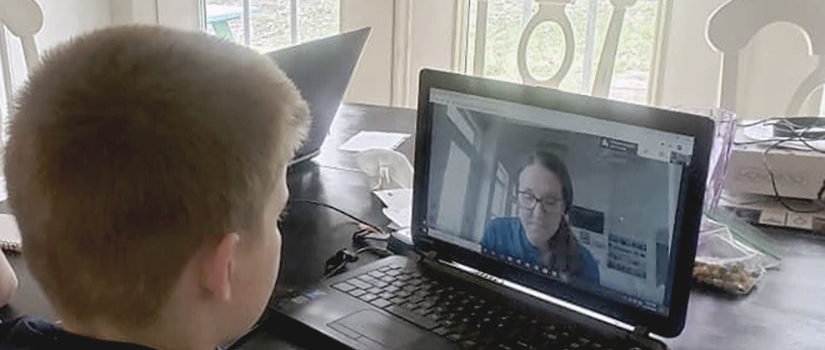While no one could foresee the rapid shift toward virtual learning due to a global pandemic, our educational technology students were ready and equipped to handle the change. Brandy Meyers is just one of many local teachers adjusting to the strain of remote learning. Meyers will not complete her doctorate in educational technology until December 2020, but is now using her research more than ever.
“I feel like I have an edge in teaching virtually,” Meyers says. “My research on student motivation and student choice helps me plan my lessons every day.”
For those not familiar with the terms, “student choice” gives students independence in learning and allows them to focus on concepts in ways that are most interesting to their learning preferences. For example, the fourth grade social studies standard includes lessons on the Bill of Rights, but each student may choose to explore the amendments they are most passionate about. “Student motivation” is critical in keeping students engaged and active within the virtual classroom. Educators must create an online environment that students want to access if they hope to be successful remotely.
“My research on interactive note-booking allowed me to give my students the opportunity to do their own research and present content that is individualized and interesting, Meyers says. “The students are engaged because the content is more personal.”
While Meyers had a toolbox full of virtual strategies, the road has not been completely smooth.
“I did not want to lose the trust I had built in my classroom,” Meyers says. “By using Google Hangouts, I can still let my kids share the instructor role with me. Using technology to build community allows the students to learn from each other and solidify their understanding.”
Meyers also has the opportunity to serve as a resource to her school, Oak Pointe Elementary in Irmo, South Carolina, where she teaches social studies and math.
“I have definitely seen an increase in people asking me for help,” she says. “Other teachers, and even the technology specialist, know my classroom is a great lab to try out new ideas. My students are comfortable with using technology, so they are great guinea pigs!”
Her advice to teachers struggling with the technology shift is to embrace it.
“Technology is revolutionary to your teaching,” she says. “It can be difficult to figure out which apps and sites will work best in your classroom, but the best method is to keep experimenting. The internet is your friend! Research, try new things, and find out what works best for you and your students and share what you learn. It can help someone else.”
For those considering pursuing an advanced degree in educational technology, Meyers says the ease of the program was central to her success.
“I did not have my hand held by any means, and I really had to push myself as a learner. I felt 100 percent supported the whole time and built a wonderful community at the university. I know I would not have been as comfortable implementing the same strategies in my classroom if I had not experienced them myself first. This program has empowered me and made me a better educator and colleague.”
The College of Education's programs in educational technology are taught 100 percent online and are designed to prepare leaders in the meaningful integration of educational technology in teaching, learning and performance environments. For more information on our master’s and doctoral programs in educational technology, visit sc.edu/education.
